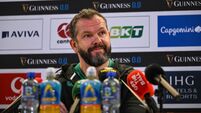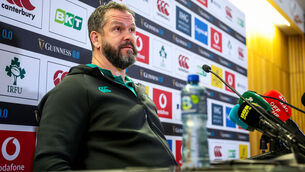Stringer relishing return to the big time
In his first Heineken Cup start for 17 months, Stringer stepped into the action last Saturday in place of the injured Tomás O’Leary and played in the 23-17 defeat to London Irish. The way the game played out, with Munster getting only one put-in at scrum time against the Exiles, it called for an adjustment that Stringer and his team-mates are keen to be better prepared for at Thomond Park.
“You train and you train to get all your set-piece plays and you practice a lot of moves off the scrum and then you get into a game and there’s only one scrum and it’s difficult to adjust,” Stringer said. “The lineout didn’t go as well as we’d hoped and we didn’t get good quality ball off set-pieces to work with.














